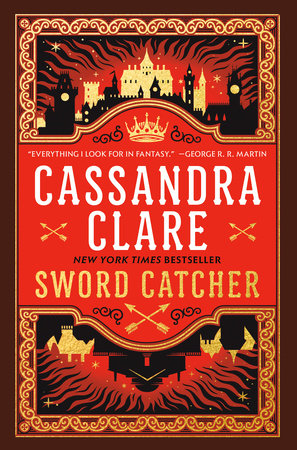Excerpt
The Ragpicker King
CHAPTER ONEIn the Hayloft, Kel and Conor were practicing their swordplay.
It had been some while since there had been time for practice, and both were a little rusty. Still, the moves came back as they always did. Muscles had their own memories, as Jolivet often said. Kel had begun the morning feeling stiff, his body half asleep and his joints objecting to being stretched. Now, after an hour or so of drills in the space they’d trained in since they were young boys, he felt flexible, his muscles fast and liquid.
The flat of his blunt-tip sword slammed against Conor’s with a metallic ring. Kel pressed his advantage, but this time Conor leaped out of the way, jumping onto one of the hay bales that, scattered about the room, served to create a changing terrain for practice. He raised his left hand, signaling a time-out.
Kel let his sword arm fall, rolling his shoulders back.
Conor raked a hand through his sweaty dark hair, frowning. “We need to do this more often,” he said. “I can barely recall what to do with my blade. Too many late nights at the desk, exercising nothing but my writing hand. I’ve turned into a pudding from inaction these past months, Kellian.”
“I wouldn’t say a pudding,” Kel objected. Conor was as trim and fit as ever. Busy as he was, he still swam and rode his horse Asti nearly every day. Besides, hadn’t the Queen been fretting that he was too thin just the other day? If he was having trouble, it was far more likely to be the late hours and lack of sleep causing it.
Not that Kel would ever say so. Conor was willing to hear things from Kel that he would never stand for from someone else, but the subject of the great change in Conor that had begun three months ago—his strange new dedication to his role in actual governance—was off limits even to his Sword Catcher. Kel guessed it was because the whole business was a sort of penance for Conor, but it was only a guess. It had to be. Conor would not speak on the subject, and Kel did not press.
“We can certainly train more often, if you’d like,” he said now. “You can join my sessions with Jolivet. I stand ready,” he added, “to assist with all pudding-avoidant activities.”
He raised his sword, indicating the time-out was over. Conor laughed and spun down from the hay bale, bringing his blade across in a sideways strike. Kel responded with an overhand cut, the swords slamming together with the satisfying sound of steel on steel. Kel danced backward, out of harm’s way, as Conor came toward him.
They had been practicing such sword-work together for so long that they knew each other’s ways: Conor tended to be too reckless, Kel too careful. They were comfortable enough to carry on a conversation even as they parried and redoubled, lunged and feinted.
“Are you feeling ready?” Kel asked. “It will be the first Dial Chamber meeting since—in nearly four months.”
He had almost said since before the Shining Gallery slaughter. Though Conor was willing to speak of the attack on the Palace and the murder of the little Princess from Sarthe, he did not like to be reminded. He had nightmares, still, about it, and woke up screaming; Kel, who slept in the same room with the Prince, would remain awake when that happened, tensed and waiting for Conor’s breath to even out. For him to sleep again.
Parry, riposte. Conor ducked nimbly back, his face expressionless. “A bunch of cowards,” he said, referring to the Charter holders—the eleven most powerful families in Castellane. “Half of them seem convinced they’ll all be murdered the moment they set foot in Marivent.” (To be fair, Kel thought, the last time they’d all come to Marivent for a banquet dinner, they nearly had all been slaughtered.) “Of course, they won’t say that’s the problem. They fuss about being busy or having strange ailments. But Mayesh has put about rumors that I have a significant announcement, so this time curiosity drives them.”
Despite the fears of the aristocracy, Conor had been determined that the monthly Dial Chamber meetings be reinstated as soon as possible. He had gone to each of the holdouts individually to point out that they could not hide themselves away like rats but must present a unified, stalwart front. There were always going to be spies—especially now, with Castellane being squeezed like a grape in a wine-press by Sarthe’s demands. Should the spies return to their homelands with the information that the ruling class of Castellane were terrified, it would only go worse for them all in the end.
“And it’s quite an announcement,” Kel said.
Conor tried a vertical cut; Kel defended with a parry quarte. Conor gave him a sharp look. “You’re worried,” he said. “Do you think I’m doing the wrong thing?”
“No,” Kel said. “But the nobles may disagree. The last time you told them you were marrying to solve the nation’s problems, it ended badly.”
Badly being an understatement. Badly being the slaughter in the Shining Gallery that was the cause of Conor’s nightmares. And the reason that Kel not only did not ask questions, but also kept secrets. Far more secrets than he had ever wanted to keep.
“Well, this decision was not only mine. It was also Jolivet and Mayesh’s. And my mother’s. As for my father . . . Well, they will get no answers on that front.”
Indeed not. The day after the slaughter, the King had entered the North Tower. He had not left it since. Food was brought to him there; he did not emerge, did not speak, did not respond when spoken to. Mayesh had named it a kind of shock—catatonia, he called it—and said that, like an illness, it would heal in time.
Yet the extent of the King’s withdrawal had been kept a secret. Besides Kel, only Conor, Mayesh, Jolivet, and the Queen knew he did not speak, that the “King’s orders” that emerged from the North Tower were actually Conor’s orders, crafted with the advice of Mayesh and Jolivet.
“Yes,” Kel said. “It is something of a shame. You have fended off war with Sarthe all this time with extraordinary diplomacy.” Late nights of work, carefully crafted missives, apologies that admitted no culpability, accommodations without capitulations. “But you will not get the credit. Not from the families.”
“Perhaps not,” Conor said. “But I am the one with experience of blackmail.” His smile was a blade. “Sarthe does not care about the death of the Princess. They care about the leverage it gives them to make demands. And once a blackmailer gets their hooks in you, it won’t end neatly. They’ll keep coming back, always wanting more, no matter what you give them. Sarthe will not just go away one day the way Prosper Beck did.”
Prosper Beck. Sometimes Kel found it hard to believe the criminal he’d once bargained with for Conor’s safety and sanity had simply left Castellane. It was the existence of Beck that had pulled him into the Ragpicker King’s shadow world in the first place—Beck had set himself up as a challenger to Andreyen, and the Ragpicker King had employed Kel to find out who on the Hill was bankrolling Beck’s various criminal enterprises. Beck had seemed to Kel a crueler, more dangerous version of the Ragpicker King himself, someone not held back by Andreyen’s peculiar code of honor. A wild card, capable of anything.
Conor was still talking about Sarthe; Kel forced his mind back to the present. “The only thing that will make the Sarthians stop is if we show that we are too powerful to bully. If we secure money and warships through this marriage, Sarthe will realize it is too dangerous to try to bleed us dry.” His gray eyes flashed. “That reminds me. Speaking of marriage, Artal Gremont should arrive soon. Then we will all have to prepare for what will surely be an interminable show of triumph as Lady Alleyne prepares to marry her daughter off.”
Kel moved to parry Conor’s jab a moment too late, and Conor tapped him with the protective cap of his sword as if to say, Pay attention. Kel said woodenly, “Indeed, this will be the culmination of her plans for Antonetta. I wonder what she will find to engage her once the ink on the certificate of marriage dries.”
“I assume she will do all she can to meddle in the affairs of Gremont’s tea Charter as well as her own,” said Conor. “I will have to keep an eye on the two of them. That much power concentrated in one family is likely trouble. At least Antonetta is not ambitious,” he added, “though her mother may prod her to make trouble.”
Not ambitious. It was what everyone thought of Antonetta; only Kel knew they were all of them wrong. He remembered her telling him that she wanted control of the silk Charter, and at another time she had told him that her mother did not think it acceptable for an unmarried woman to control a Charter. If she and Gremont married, though, each of them would hold their Charter individually until it became time to will the Charters to a new generation. That she was willing to marry a lout like Gremont in order to control the most valuable Charter in Castellane spoke quite a bit to her ambition.





